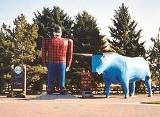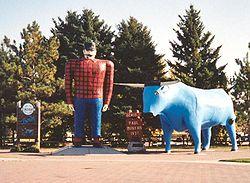
Richard Dorson
Encyclopedia
Richard Mercer Dorson was an American
folklorist
, author
, professor
, and director of the Folklore Institute at Indiana University
.
Dorson was born in New York City
. He studied at the Phillips Exeter Academy
from 1929 to 1933.
He then went on to Harvard University
where he earned his A.B., M.A., in history, and his Ph.D. degree in the History of American Civilization in 1942. He began teaching as an instructor of history at Harvard in 1943. He moved to Michigan State University
in 1944 staying there until 1957 when he took a position at Indiana University
as professor of history and folklore as well as that of chairman of the Committee on Folklore. He taught at Indiana until his death.
When the Indiana University Folklore Institute was established in 1963 Dorson became the first director, and in 1978 he became the first chairman of the Folklore Department.
 Dorson has been called the "father of American folklore" and "the dominant force in the study of folklore". That study, according to Dorson, involved several roles; "polemicist, critic
Dorson has been called the "father of American folklore" and "the dominant force in the study of folklore". That study, according to Dorson, involved several roles; "polemicist, critic
, field collector, library scholar". Dorson also wrote that "no subject of study in the United States
today [1976] is more misunderstood than folklore".
Dorson contributed two terms to the study of folklore that have gained common currency. The first is "urban legend
"; meaning a modern "story which never happened told for true". Dorson also coined the word "fakelore
" in a debate with author James Stevens. Dorson dismissed Stevens' book on Paul Bunyan
, and the later work of Ben Botkin as fakelore, or "a synthetic product claiming to be authentic oral tradition but actually tailored for mass edification", which "misled and gulled the public". Dorson's fieldwork touched upon African-American folklore in Michigan
, folklore of the Upper Peninsula, other regional folklore in the United States, the folklore of Japan
, and other topics. Among other academic recognitions, Dorson was awarded the Library of Congress
award in History of American Civilization in 1946, and three Guggenheim Fellowship
s (1949, 1964, and 1971). In 2003, Minnesota State University awarded him their "Heritage Award" posthumously.
United States
The United States of America is a federal constitutional republic comprising fifty states and a federal district...
folklorist
Folkloristics
Folkloristics is the formal academic study of folklore. The term derives from a nineteenth century German designation of folkloristik to distinguish between folklore as the content and folkloristics as its study, much as language is distinguished from linguistics...
, author
Author
An author is broadly defined as "the person who originates or gives existence to anything" and that authorship determines responsibility for what is created. Narrowly defined, an author is the originator of any written work.-Legal significance:...
, professor
Professor
A professor is a scholarly teacher; the precise meaning of the term varies by country. Literally, professor derives from Latin as a "person who professes" being usually an expert in arts or sciences; a teacher of high rank...
, and director of the Folklore Institute at Indiana University
Indiana University
Indiana University is a multi-campus public university system in the state of Indiana, United States. Indiana University has a combined student body of more than 100,000 students, including approximately 42,000 students enrolled at the Indiana University Bloomington campus and approximately 37,000...
.
Dorson was born in New York City
New York City
New York is the most populous city in the United States and the center of the New York Metropolitan Area, one of the most populous metropolitan areas in the world. New York exerts a significant impact upon global commerce, finance, media, art, fashion, research, technology, education, and...
. He studied at the Phillips Exeter Academy
Phillips Exeter Academy
Phillips Exeter Academy is a private secondary school located in Exeter, New Hampshire, in the United States.Exeter is noted for its application of Harkness education, a system based on a conference format of teacher and student interaction, similar to the Socratic method of learning through asking...
from 1929 to 1933.
He then went on to Harvard University
Harvard University
Harvard University is a private Ivy League university located in Cambridge, Massachusetts, United States, established in 1636 by the Massachusetts legislature. Harvard is the oldest institution of higher learning in the United States and the first corporation chartered in the country...
where he earned his A.B., M.A., in history, and his Ph.D. degree in the History of American Civilization in 1942. He began teaching as an instructor of history at Harvard in 1943. He moved to Michigan State University
Michigan State University
Michigan State University is a public research university in East Lansing, Michigan, USA. Founded in 1855, it was the pioneer land-grant institution and served as a model for future land-grant colleges in the United States under the 1862 Morrill Act.MSU pioneered the studies of packaging,...
in 1944 staying there until 1957 when he took a position at Indiana University
Indiana University
Indiana University is a multi-campus public university system in the state of Indiana, United States. Indiana University has a combined student body of more than 100,000 students, including approximately 42,000 students enrolled at the Indiana University Bloomington campus and approximately 37,000...
as professor of history and folklore as well as that of chairman of the Committee on Folklore. He taught at Indiana until his death.
When the Indiana University Folklore Institute was established in 1963 Dorson became the first director, and in 1978 he became the first chairman of the Folklore Department.

Critic
A critic is anyone who expresses a value judgement. Informally, criticism is a common aspect of all human expression and need not necessarily imply skilled or accurate expressions of judgement. Critical judgements, good or bad, may be positive , negative , or balanced...
, field collector, library scholar". Dorson also wrote that "no subject of study in the United States
United States
The United States of America is a federal constitutional republic comprising fifty states and a federal district...
today [1976] is more misunderstood than folklore".
Dorson contributed two terms to the study of folklore that have gained common currency. The first is "urban legend
Urban legend
An urban legend, urban myth, urban tale, or contemporary legend, is a form of modern folklore consisting of stories that may or may not have been believed by their tellers to be true...
"; meaning a modern "story which never happened told for true". Dorson also coined the word "fakelore
Fakelore
Fakelore or Pseudo-folklore is inauthentic, manufactured folklore presented as if it were genuinely traditional. The term can refer to new stories or songs made up, or to folklore that is reworked and modified for modern tastes...
" in a debate with author James Stevens. Dorson dismissed Stevens' book on Paul Bunyan
Paul Bunyan
Paul Bunyan is a lumberjack figure in North American folklore and tradition. One of the most famous and popular North American folklore heroes, he is usually described as a giant as well as a lumberjack of unusual skill, and is often accompanied in stories by his animal companion, Babe the Blue...
, and the later work of Ben Botkin as fakelore, or "a synthetic product claiming to be authentic oral tradition but actually tailored for mass edification", which "misled and gulled the public". Dorson's fieldwork touched upon African-American folklore in Michigan
Michigan
Michigan is a U.S. state located in the Great Lakes Region of the United States of America. The name Michigan is the French form of the Ojibwa word mishigamaa, meaning "large water" or "large lake"....
, folklore of the Upper Peninsula, other regional folklore in the United States, the folklore of Japan
Japan
Japan is an island nation in East Asia. Located in the Pacific Ocean, it lies to the east of the Sea of Japan, China, North Korea, South Korea and Russia, stretching from the Sea of Okhotsk in the north to the East China Sea and Taiwan in the south...
, and other topics. Among other academic recognitions, Dorson was awarded the Library of Congress
Library of Congress
The Library of Congress is the research library of the United States Congress, de facto national library of the United States, and the oldest federal cultural institution in the United States. Located in three buildings in Washington, D.C., it is the largest library in the world by shelf space and...
award in History of American Civilization in 1946, and three Guggenheim Fellowship
Guggenheim Fellowship
Guggenheim Fellowships are American grants that have been awarded annually since 1925 by the John Simon Guggenheim Memorial Foundation to those "who have demonstrated exceptional capacity for productive scholarship or exceptional creative ability in the arts." Each year, the foundation makes...
s (1949, 1964, and 1971). In 2003, Minnesota State University awarded him their "Heritage Award" posthumously.

